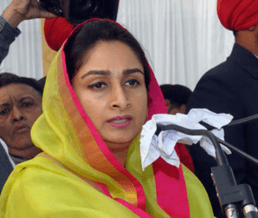President accepts Union Minister Harsimrat Kaur Badal’s resignation
On September 17, 2020, the Union Food Processing Industries Minister Shrimati Harsimrat Kaur Badal resigned over the protest against the three farm sector bills. The President of India Ramnath Govind accepted the resignation under the advice of the Prime Minister Shri Narendra Modi.
Highlights
Further, under the advice of the Prime Minister, the President has directed the Union Minister Narendra Singh Tomar to be assigned the charge of Ministry of Food Processing Industries. Tomar already holds multiple portfolios such as Ministry of Agriculture and Farmer Welfare, Rural Development and Panchayati Raj.
Is Badal still a MP?
Yes. The Member of Parliament is first elected by the people and then later selected as a Minister. He or she takes two oaths, one before the chairman of Rajya Sabha or speaker of Lok Sabha as a member, two, before the president of India as a minister. When a Minister resigns his resignation will not affect his membership of parliament.
What is the issue?
The Government of India recently introduced the following bills
- Farmers Produce Trade and Commerce (Promotion and Facilitation) bill,
- Farmers (Empowerment and protection) Agreement on Price Assurance and Farm Services bill
- Essential Commodities (amendment) bill.
These bills have replaced the ordinances that were promulgated earlier. These bills have now been passed in Lok Sabha. Following the introduction of these bills in the Parliament there were huge protests in the states of Punjab and Haryana. Shrimati harsimrat has resigned over this issue.
Are the prime minister and other ministers elected or appointed?
APPOINTED. The Prime Minister and other ministers in the Parliament are appointed by the President of India. Article 75 of the Indian Constitution says that the Prime Minister is the person appointed by the president. There is no specific procedure for his appointment. The president appoints a person as the Prime Minister who is either the leader of the party that holds majority in Lok Sabha or the person who wins confidence of Lok Sabha by gaining the support of other political parties. The president can also appoint the prime minister on his own discretion. However, this is possible only when no party has gained clear majority in the Lok Sabha.
Types of ministers
The constitution of India does not categorise ministers into types. However, by practice there are four types of ministers in India. They are
- Cabinet ministers: these ministers of present and participate in every meeting of the cabinet.
- Minister of state with independent charge: he does not work under a cabinet minister. He attends the meeting of cabinet only when a matter concerning his department is on the agenda.
- Minister of state: he works under a cabinet minister. He does not have any independent charge of any department. The works of these ministers are allotted by the cabinet minister.
- Deputy minister: he works under Cabinet Minister or minister of state with independent charge. The works of a deputy Minister is allotted by the Minister under whom he is working.
Constitutional provisions of resignation of minister
- The third Schedule of Government of India (Transaction of Business) Rules, 1961 says that the Prime Minister and other ministers of the union shall resign submitting a letter to the president of India.
- The Transaction of Business Rules were made under clause 3 of article 77. The rules were made for more convenient transaction of business of Government of India. The rules dictate functions and appointments of cabinet committee as well.
- Schedule 3 of the constitution speaks about Union Ministers, members of parliament, judges of supreme court, state ministers, Comptroller and Auditor General of India, etc.
Month: Current Affairs - September, 2020


